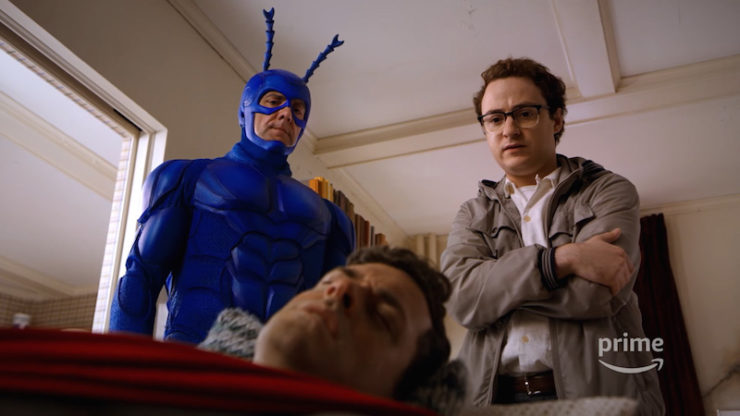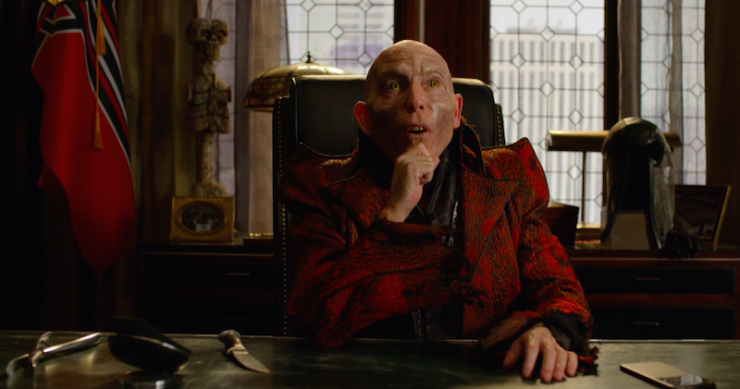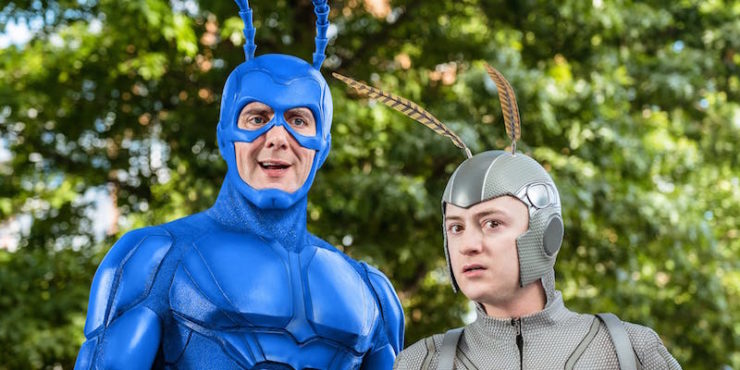The second half of The Tick is even better than the first half. I am so happy this show is on the air, that Ben Edlund got another crack at the character, that they all took a chance on updating a beloved world knowing that people might reject another reboot. On of the best thing about watching The Tick is realizing that a story that began as a silly parody of superhero stories has outgrown most of those stories. There is more emotion and thematic heft in a 22-minute episode of this show than in half of the MCU, or any non-Wonder Woman DC movie.
To start with a non-spoiler paragraph: Should you go watch it if you watched the first half? YES. Should you go back and watch the entire season if you missed it? YES. Can you watch it if you’ve never seen a superhero show or movie before? YES, and as long as you accept the conceit of people running around in suits saving the world, you’ll enjoy it. Can your kid watch it? PROBABLY, in fact it will probably make them a better person, but more on that below. What about grandma? YES. Is it an accurate reflection of a sort of alternate New York, where diversity is simply reality and the community is made up of people from all sorts of backgrounds, who fall on all different parts of the hero/villain spectrum? YES. Is there a talking dog who has written a conversion memoir about secular humanism? Um, actually, YES. Does Alan Tudyk play a sentient boat who is trying to figure out his sexuality? …that’s a super specific question, but the answer is YES.

The second half is just as fun and funny as the first. Peter Serafinowicz continues to be a perfect Tick, and once again Griffin Newman lends a shocking amount of emotional truth to a character who used to be a helpless sidekick. Jackie Earle Haley is absolutely terrifying as the, um, Terror, and Yara Martinez continues to be the standout of the entire cast as Miss Lint—and she gets to go wayyyy darker in this half of the season. My personal favorite character continues to be Arthur’s stepfather (not his real father!) Walter, played by The Expanse’s Françoise Chau. The pacing of the second half is great (with lots of gags about whether or not The Terror’s plot actually makes sense) and unlike in previous incarnations of The Tick, there are real stakes. Lots of them.
There are a few moments of violence, and some intense scenes that might be a bit much for small children, but my guess would be that anyone over 10 will be fine, and plenty of people under that age will be OK, too. I would have been fine with this as a youngling.
OK, now, let’s get into spoilery thematic stuff.
First of all, this is a goddamn master class in rebooting and reconfiguring your own work. I know I tend to say nice things about Ben Edlund, but he and his writing team have performed a miracle with this show. You want “Spoon!”? Well, you’ll get it, but it’s completely re-contextualized here. You want “Not in the face!”? Well, you’ll get that too, but you might by crying when Arthur says it. Superian is a lovely riff on the arrogant superhero trope, because he has a real personality under there, even if you only see it for a second. Overkill is an astonishing Punisher riff, but he also might be a sexual abuse survivor? Dot is a huge improvement on Arthur’s oppressively square sister in previous incarnations, but now you’re genuinely scared for her when she tries to be an effective member of the team. Miss Lint is a fun, villainous riff on the vaguely domme-y American Maid and Captain Liberty (who is also named Janet—what does Ben Edlund have for/against the Janets of the world?) but under that exterior is deep-seated insecurity, abusive tendencies, and fury at being expected to play second fiddle to incompetent men—there’s a lot going on under all the puns.
Which leads me into why The Tick is important. We’re currently living under a glut of superhero movies. I love this genre, and even I’m sick of it at this point. (Except for Black Panther. I’ll never be sick of Black Panther. Wakanda Forever.) But what are all these movies about? So many of them are “Loved One is Murdered, Survivor Dons a Suit” or “I Must Seek Vengeance/Justice” or “I have Superpowers, I Will Use Them To Help Less Powered People.” But it’s so often just a given. The supers end up with powers, and either use them for good or evil. Sometimes, in the best iterations of superhero-dom like Daredevil and Wonder Woman, we see the supers struggling to find the best way to help people. Sometimes, as in Black Panther and Thor: Ragnarok, they have to decide how many people to help—who counts as a Wakandan? Who counts as an Asgardian? Sometimes, as in The Incredibles and the X-Men movies, the powers are innate, and the wrestling is to be between hiding and being openly super. But somehow in The Tick we get the conversation we never get: WHY. Why are we helping? Why are we hurting? Who are we? What makes us super?
Arthur himself spends the entire season deciding whether or not to be a hero. It would be easier not to do it. But once he starts acting heroically, he needs to think about why. Why should he put himself in danger?

Toward the end of this season, Arthur checks in on Superian (The Tick‘s Superman stand-in) who has been poisoned by a substance called “Big Bismuth”—essentially rendering him drunk and vulnerable. Arthur asks, “Why do you help us?” and Superian doesn’t say “Because with great power must come great responsibility,” or “I need to uphold my sense of justice in the universe.” What we get is him murmuring “I want to be a good person.” His voice cracks on the line. Gone is the winning smile, the strong jawline; he sounds like a child.
He sounds a lot like Arthur.
From that moment Arthur takes on the central role in the team’s plan to save the City. This struggle is the core of the show, but around it swirls arguments about humanity’s place in the universe. The Tick doesn’t know who he is, but he wants to. He knows he’s a hero. He believes that he was called by Destiny, and that he picked up the phone and said yes. But he has not idea who or what he actually is. (This leads to a long sequence of him thinking he might be a robot, which is hella funnier than any of Logan’s introspective motorcycle journeys through the Canadian wilderness.) Midnight the Talking Dog recurs throughout this half of the season turning up on a book tour for his memoir about his loss of faith in God after the death of his master, Flag Five member Christian Soldier. (“I’m just a simple, plain-talking German Shepherd who can start fires with his mind, but it humbles me to know that so many good people, like yourself, find meaning in my secular journey.”) The Terror straight-up says that the universe is meaningless, and that he’s just fucking with people for fun.

Overkill has to question whether vengeance is a good enough motivation. Dot has to fight with both Arthur and Overkill about her worthiness to be part of the team, which mirrors Miss Lint’s fight to become a full supervillain rather than just a man’s lackey. Dangerboat has to work out his identity as a boat who identifies as male, and his sexuality as a male boat who’s attracted to other males, but not necessarily other boats: “Can a boat be ‘homosexual’ if that prefix is derived from the Greek word for ‘same’…when clearly we’re not?”
But beyond this introspection is a very different conversation: What is the nature of the universe? What is humanity’s role in that nature?
In trying to figure out who he is, The Tick becomes convinced that he’s a robot. This leads to the conversation about free will, with Arthur pointing out that without free will, The Tick wouldn’t even be able to ask himself about who he is, or what his purpose is. Arthur seems to believe unthinkingly in free will—which is interesting for a man who has to regulate his brain chemistry with a cocktail of meds. The Tick decides he’s pro-free will, but he also seems to believe in Destiny almost as though it’s a conscious entity, pushing him through the world and into different adventures. Midnight believes that there is no “purpose” to life, that all is just random chance, and comes out of that with a Camus-ian dedication to knowing himself. The Terror thinks there’s no “purpose” to life, which means he can be as evil as he wants. The meet a real robot (a riff on the Red Scare, I think) who seems to be capable of a nuanced conversation with The Tick, until his “owner” flips him back into assassin mode. When we finally see Tinfoil Kevin’s office, it turns out to be a giant detached robot head. A mad scientist switches sides in order to save Superian and the City. Ordinary people are weaponized by the Terror, and then The Tick and Arthur risk their lives to save them. Characters like the bodega owner and Tinfoil Kevin leave their daily routines behind to help the heroes.
There’s a key moment in “Tale from the Crypt,” the first episode of the second half of the season: Arthur has escaped from The Terror’s lair, grabbing his suit along the way, and he’s steps from freedom when he realizes he has to go back for another prisoner, the mad-ish scientist Dr. Karamazov. You watch him trying to talk himself out of it, but he knows it’s the right thing to do. What the audience learns a few minutes later is that the entire thing was a con: Miss Lint let him escape, The Terror planted the suit, and was counting on him rescuing Karamazov. It’s all part of a much larger plot, in which The Terror intends to use Arthur as a weapon against Superian, murdering him in the process. But of course that isn’t what happens (it would be a pretty dark show if it did) because Arthur’s free will, and that of Dr. Karamazov, defeat The Terror’s determinism. By working together and taking giant heroic risks, Arthur, The Tick, and their ragtag team of misfits subvert all of the supervillain’s plans and save the day…but only because each member of said ragtag team plays their own vital role.
The Tick isn’t just giving us one of the best representation of what true heroism looks like, it’s also asking why anyone would be a hero. It’s asking what “good” means, and whether the concepts of destiny and free will can coexist. It’s pointing out that no one can be a hero in a vacuum, and that sometimes your friendly neighborhood bodega guy has just as important a part to play as the world’s greatest superhero.
Leah Schnelbach is so happy this show exists. Come yell “Spooooon, Season One, Part Two” with her on Twitter!










